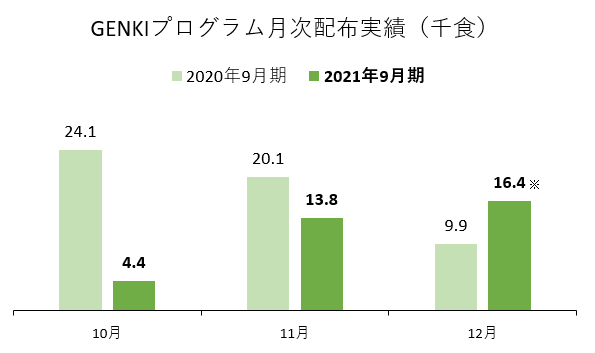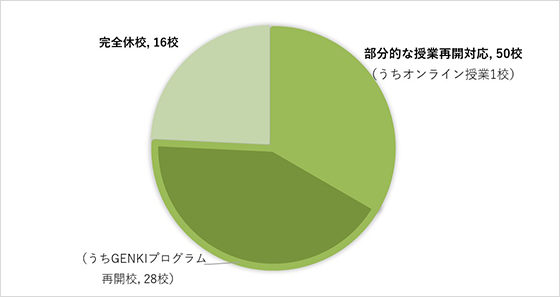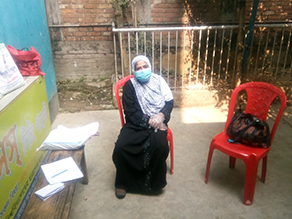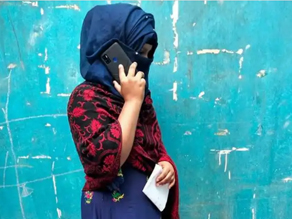バングラデシュにおけるコロナ禍での教育への影響
【2020年12月の活動報告】
1. December 2020 activity report
In the GENKI program, we resumed the distribution of Euglena cookies during the period when Corona was closed * 1. In December, 164,000 meals of cookies were distributed to approximately 5,800 people at 28 of the 66 schools covered by the GENKI program.

※1休校中でも先生方にはクッキー配布の為、学校に来ていただき、プログラムを再開する仕組みを確立しています。コロナ禍におけるGENKIプログラムの活動状況については、2020年8月、2020年10月の活動報告をご参照ください。
※2 例年12月は月の半分以上が冬休みで配布日数が少なくなりますが、2020年度は15日分を1度にまとめて計2回(合計30日分)配布しました。そのため、コロナ禍前の2020年9月期より配布数が多くなっています。
2. Impact of new coronavirus infections on educational disparities in Bangladesh
Schools have been closed in 191 countries around the world due to the spread of the new coronavirus infection, according to UN news. This has affected the education of at least 1.5 billion children * 3.
Class styles have become remote-centric, and the presence or absence of an Internet environment has become a global problem due to the disparity in educational opportunities.
In Bangladesh, school closures began on March 17, 2020. In October, the government called on schools to take extra measures, such as giving students assignments on a regular basis, but the number of schools that can handle them is limited. As of October 2020, 30-40 million students in Bangladesh are still not taking regular classes * 4 * 5.
In Bangladesh, dealing with online lessons is a challenge for both teachers and students. For example, 90% of people do not have a large screen device * 4, and the penetration rate of smartphones is 18.9% as of 2019 * 6.

There is also the issue of internet communication costs. 1GB (equivalent to 2 hours of watching medium-quality videos) averages $ 3.91 (about 407 yen) in Japan, but averages $ 0.7 (about 73 yen) in Bangladesh, which is less than 1/5 * 7, but most of Bangladesh still It's not cheap for people * 4.
Many students are feeling the limits of learning at Corona, and are worried about whether they will be able to graduate as planned and their future.
* 3 UN News (2020). Startling disparities in digital learning emerge as COVID-19 spreads: UN education agency
* 4 Emon et al. (2020). Impact of COVID-19 on the Institutional Education System and its Associated Students in Bangladesh: Asian Journal of Education and Social Studies 11 (2): 34-46
* 5 BIPSS Community (2020). The impact of COVID-19 Pandemic: Education sector of Bangladesh
* 6 Newzoo Global Mobile Market Report 2019 | Light Version
* 7 Cable.co.uk (2020). Worldwide mobile data pricing 2020. The cost of 1GB of mobile data in 228 countries
3. Status of schools subject to the GENKI program
Of the 66 schools targeted for the GENKI program, which are attended by children in slums, 50 of the 66 schools regularly invite students to school and impose assignments on some of them. Only one school is available for online classes. About 1 in 4 schools (2,580 registered students) is still completely closed.
Not only that, but among schools that rely on donations for their operations, three are at risk of survival. The background is that donors can no longer afford to donate due to business losses and increased medical costs for their families.

4. Education in the crisis of school management
What are teachers and children doing in a school that is completely closed?
Mamunur Rashid Elementary School, which is a target school for the GENKI program, has already lost the school building itself. The school was run in a rental building, but due to the lack of donations, the building will be returned in May 2020.
Students are forced to spend time playing and helping with household chores while school closures make their studies unsatisfactory. Teachers are concerned that students will drop out or work in child labor if they leave study for long periods of time. Since the school closure began, we have not been able to contact about 30% of the students.
Also, before the pandemic, Euglena cookies to 60 students at the school every day, but now that the school building itself is gone, there is no prospect of resuming distribution. It is said that the students are not in a situation of starvation immediately, but some families are suffering from plight by receiving government relief measures other than the GENKI program and reducing the quantity and quality of food.
Even so, the teachers are planning to continue their education somehow. Principal Reihan Feldush asks the building manager to use a small space, and teachers go to the space twice a week to communicate with students over the phone.


Ahmed Redui, a fifth grader, uses her parents' mobile phones to receive calls from the principal and teachers. "The teacher encourages me to continue studying. I am studying math, Bengali, English and social sciences, but it is very difficult to learn new things in such an environment." It was.
Principal Feldushi is concerned that the disruption of the student-school relationship will have a negative impact on the student's mental health and is continuously calling the students with other teachers.
“Telephone-only conversations cannot provide effective education and solve student problems, but they can help maintain relationships with students.”
Principal Feldushi is working hard to raise money to rent the school building again and hopes that the children will be able to take classes again at school and benefit from education.
As introduced this time, there are many schools that have not yet been able to resume classes due to the blockade of the city (lockdown). We will continue to share information with schools that are closed and will continue to implement the GENKI program from schools where classes have resumed.
In a global pandemic, we will continue to do what we can for our children in Bangladesh. Thank you for your continued support.
Euglena Co., Ltd.
Overseas Business Development Department / Bangladesh Office

